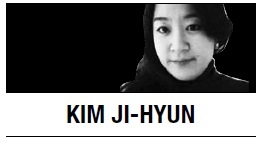Second Opinion
[Kim Ji-hyun] Thirst for a female leader
 |
“No country can ever truly flourish if it stifles the potential of its women and deprives itself of the contributions of half of its citizens.” — Michelle Obama
...
It’s a well-known quote, and by a woman who was a working professional, a mother and also the wife of one of the most respected men on earth. So the saying, that behind every great man is a great woman, really does ring true in this case. And unlike many of Obama’s predecessors, Michelle went her own way and showed that the wife of a president could have her own opinion and not be shy of expressing them while at the same time supporting her husband.
Michelle also was first lady at a time when America was ready to embrace such leadership from the first couple. Hillary Clinton, on the other hand, came a bit ahead of her time. So it’s not always just about the brand or quality of leadership, but perhaps also about timing and luck.
Still, essentially, these ladies and many more across the world have proven that women have much to contribute to society across-the-board, and that they can play and work just as hard or even harder than men. I long to see such female leadership in Korea. In the workplace, at home or in political circles, I hope to see the day when women, regardless of their age or race, can guide and lead their organizations with courage and with integrity.
But right now, there is a dilemma. And that dilemma is, there are a “few good women.”
Take Kang Kyung-wha, the presidential nominee for foreign minister. We’ve seen the news, but let’s recap a bit. She is one of the rare breeds at the ministry, having entered without passing the state exam and working her way up. While at the ministry and at the UN, she earned a respectable reputation. Oh Joon, former South Korean ambassador to the UN, recently posted a personal recommendation about Kang on his Facebook account, giving her rave reviews.
On a personal level, I can’t say I admire what Kang did for her daughter’s education. Everyone wants their kids to go to good schools, and using your connections to ensure that is not only unfair, but was also bad judgement on her part considering that after all, she does work for the government.
But other than that, I can’t really see why Kang should not be named foreign minister. If her critics were to talk about her abilities as foreign minister, her views on human rights issues, on North Korea, on what she contributed in terms of Korea’s diplomatic strategies, that would be a different matter.
For instance, I have issues with the presidential chief of staff Lim Jong-seok who was formerly a member of Korea’s key pro-North Korea organization. Regardless of whether he has conformed or not, I still have some doubts as to how effective such an aide would be as Seoul tries to navigate its way through the muddy waters that is North Korea.
But on Kang, that her shortcomings are based primarily on the mistakes she made as an “ordinary citizen” does not quite make sense. I remember there have been many other male foreign ministers who were not of Kang’s caliber but who were appointed without a hitch.
I do not know yet know what kind of a minister Kang would be, and whether she is actually enough of a visionary that her becoming foreign minister would contribute to and encourage female leadership, instead of hindering it. I cannot be certain that she won’t make the same mistakes regarding her family and other personal issues.
She is, however, one of the few female leaders Korea has at the moment who has a relatively good reputation and has won global approval. The skeletons in her closet weren’t welcome, but they don’t seem to be beyond forgetting. Kang should not be used as a political scapegoat.
By Kim Ji-hyun
(jemmie@heraldcorp.com)
The writer is the editor-in-chief of The Investor. — Ed.








